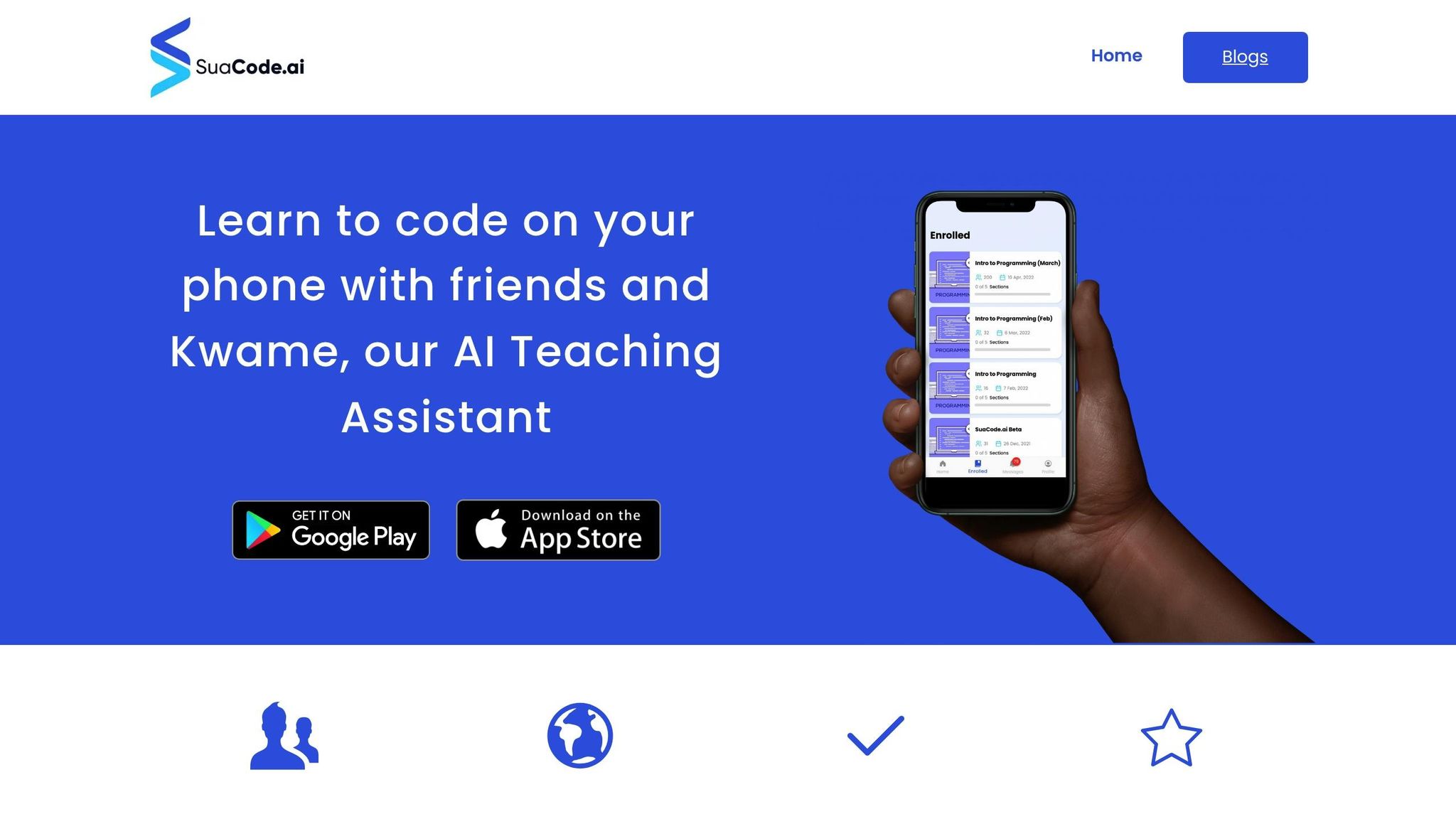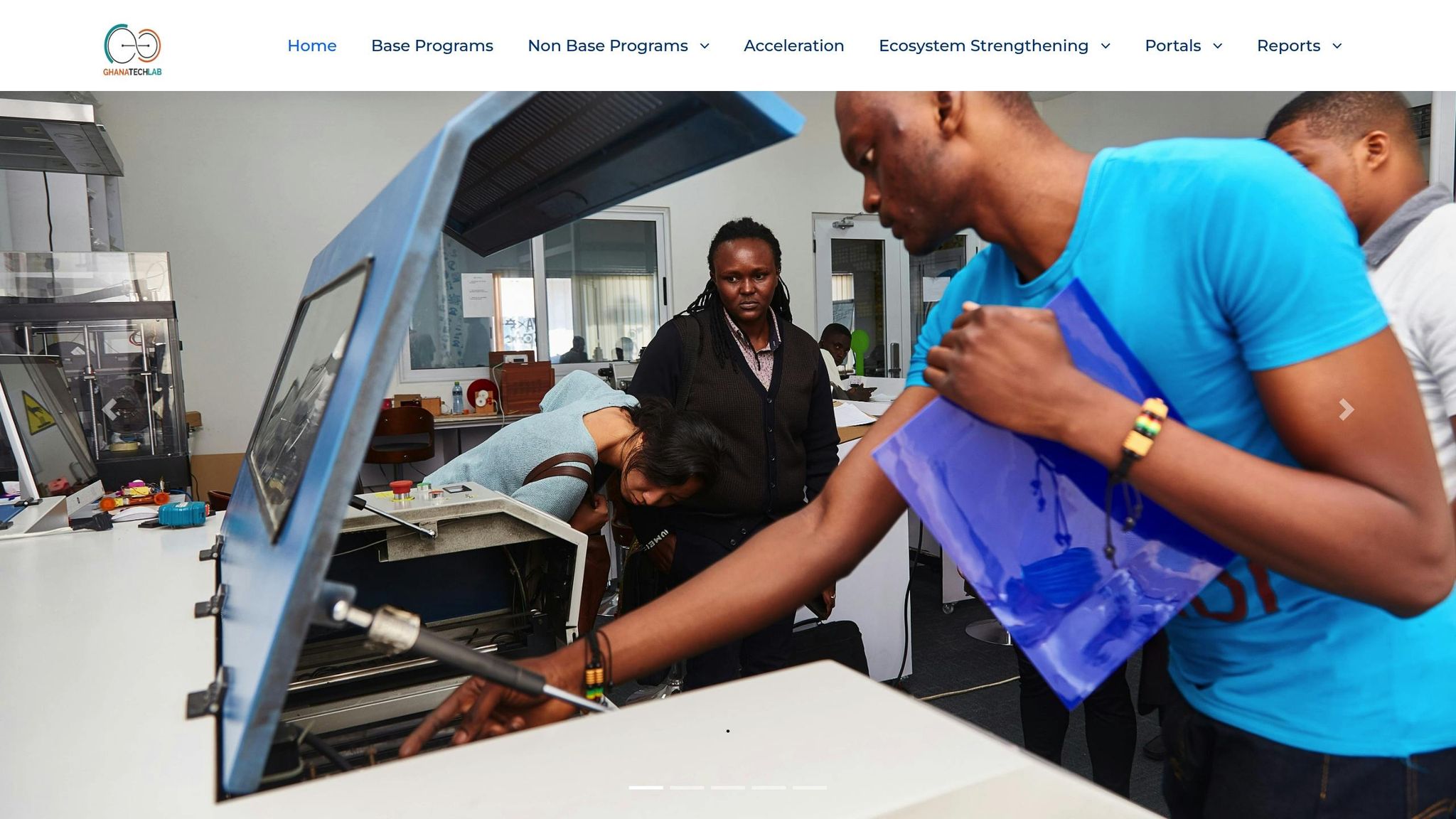AI is transforming coding education in Africa by increasing access, personalizing learning, and tackling challenges like limited internet and resources. Programs like CogLabs and Suacode.ai bring AI-powered tools, offline solutions, and multilingual support directly to students, enabling them to build tech skills and drive local innovation.
Key Highlights:
- AI Tools in Education: Smart learning systems, AI mentors, and translation tools help students learn coding faster and more effectively.
- Overcoming Barriers: Offline learning through robotics kits, SMS-based coding, and lightweight AI models makes education accessible in rural areas.
- Programs Making a Difference: Initiatives like CogLabs, Suacode.ai, and Ghana Tech Lab are equipping students with practical coding skills using AI.
- Future Trends: Augmented Reality (AR), Virtual Reality (VR), and AI-based certifications are reshaping how coding is taught and assessed.
AI is not just improving education – it’s preparing Africa’s youth to lead in the global tech arena.
Panel: African Perspectives on Empowering Students’ Learning through AI: Opportunities & Challenges
AI is reshaping how coding is taught across Africa, addressing past challenges and creating new opportunities for students.
Smart Learning Systems
CogLabs’ AI-driven platform is a game-changer in coding education. By analyzing coding patterns, tracking completion times, and identifying errors, the platform tailors practice exercises to individual needs. For instance, students working on robotics projects with 3D-printed kits receive tasks that match their skill level and progress at a manageable pace. This personalized approach not only keeps learners engaged but also ensures they master basic concepts before moving on to more advanced topics.
Local Language Support Through AI
AI translation tools are breaking language barriers by making programming concepts accessible in major African languages. Supported by the African Union’s Continental AI Strategy, platforms like CogLabs currently offer content in English, French, and Spanish, with plans to expand further. Professor Traoré emphasized the importance of aligning educational strategies with these tools:
“what remains to be done is a pedagogical alignment, in particular matching the skills identified during the workshops with the proposed levers, as well as prioritizing and sequencing the actions to be carried out over time”.
This linguistic inclusivity enables real-time coding guidance, making programming education more accessible across diverse communities.
AI-Powered Code Help
AI mentors are revolutionizing how students learn to code by providing instant feedback, identifying errors, completing code, and even offering offline support. A prime example is EON Reality‘s AI Academy Africa Incubator, launched in May 2025, which demonstrates the potential of these tools in accelerating app development.
| Feature | Benefit | Implementation |
|---|---|---|
| Real-time Error Detection | Immediate feedback on coding mistakes | Machine learning identifies common errors and suggests fixes |
| Code Completion | Speeds up learning with syntax suggestions | Predicts the next code segment based on coding patterns |
| Offline Support | Enables learning without internet | Preloaded AI models operate on basic hardware to ensure accessibility |
These tools are helping to bridge gaps in resources and infrastructure, making coding education more effective and widely available.
Across Africa, several initiatives are leveraging AI to make coding education more accessible and impactful. These programs use AI-powered tools like smart learning systems and localized content to expand opportunities for learners.
Suacode.ai: Coding Lessons Through Smartphones

Suacode.ai tackles the challenge of limited computer access by delivering coding lessons directly to smartphones. A study from Project iSWEST in Ghana (2017) found that only 25% of students had laptops, but every single one owned a smartphone. Between 2018 and 2020, Suacode.ai’s pilot programs reached 3,000 learners in 69 countries, including 42 across Africa. The program achieved a 62% course completion rate and earned a 4.9-star rating on the Google Play Store.
The platform includes innovative features like an AI teaching assistant named Kwame, available 24/7 to support learners, and AutoGrad, an automated grading system that provides personalized feedback on assignments.
| Feature | Description | Impact |
|---|---|---|
| Multilingual | Available in English and French | Expands accessibility |
| Project-Based Learning | Focus on hands-on coding projects | Builds practical skills |
| AI Teaching Assistant | Kwame offers 24/7 support | Immediate help for learners |
| Automated Grading | AutoGrad system for feedback | Faster, tailored responses |
“Democratize science and technology education across Africa using smartphones and Artificial Intelligence (AI)”
Ghana Tech Lab: Practical AI-Driven Coding Education

Ghana Tech Lab complements smartphone-based learning with hands-on, AI-enhanced coding education. The program integrates traditional coding instruction with AI tools, equipping students to tackle local tech challenges while aligning with global industry standards. This approach not only prepares learners for Africa’s growing tech ecosystem but also addresses specific regional needs.
sbb-itb-dd089af
How AI Fixes Common Education Problems
Learning Without Internet
AI is transforming offline coding education in Africa, making it more accessible even in areas without internet access. Take the Google-UNESCO CogLabs program, for instance. This initiative uses robotics kits to teach machine learning offline, bridging gaps in connectivity and resources.
Here’s how AI makes this possible:
- Compressed AI Models: These lightweight systems operate directly on devices, eliminating the need for cloud connectivity.
- SMS-Based Learning: Students can submit code via text messages, allowing them to engage in coding education using basic mobile networks.
- Peer-to-Peer Networks: Local collaboration tools let students work together seamlessly without requiring internet access.
CogLabs’ robotics kits are designed to bring hands-on AI education to students from all economic backgrounds. The program supports three languages, broadening its reach and ensuring that more learners can benefit. These offline tools are a key part of how AI is reshaping coding education across Africa.
AI Supports for Educators
AI isn’t just helping students – it’s also a game-changer for educators, especially in addressing staffing shortages. Automated systems are stepping in to lighten teachers’ workloads while enhancing the quality of instruction.
| AI Teaching Tool | Function | Impact |
|---|---|---|
| Virtual Assistants | Provides 24/7 student support | Frees up teachers’ time |
| Automated Grading | Instantly evaluates code | Speeds up feedback |
| Progress Analytics | Tracks student performance in real time | Helps identify struggling students early |
| Lesson Planning | Generates teaching materials | Saves preparation time |
The African Union’s report on the Continental Artificial Intelligence Strategy highlights how these tools are benefiting education systems across the continent. For example, progress analytics enable teachers to spot students who need extra help, while natural language processing evaluates not just code but also explanations, ensuring a well-rounded assessment. The GPE KIX report further emphasizes how this technology aligns with targeted educational interventions, ensuring that students develop the right skills for their needs.
These AI-driven solutions are particularly impactful in resource-limited settings. They help maintain high educational standards by compensating for the lack of human resources. By combining offline learning tools with automated support systems, AI is paving the way for more inclusive and resilient coding education programs across Africa.
What’s Next for AI in African Coding Education
AR and VR in Coding Classes
Augmented Reality (AR) and Virtual Reality (VR) are transforming how coding is taught, creating immersive labs where abstract concepts become tangible. Imagine students interacting with code in three dimensions, visualizing algorithms, and debugging in a virtual space. These tools not only make learning more engaging but also address infrastructure gaps by offering virtual environments accessible from almost anywhere. Plus, they’re opening doors to new ways of certifying skills, which could change how we measure coding expertise.
AI-Based Coding Certificates
In May 2025, EON Reality introduced the AI Academy Africa Incubator Initiative, a program designed to reshape coding certification. It emphasizes hands-on AI skills, including Vibe Coding, assessed through AI-powered tools that measure practical programming abilities. The African Union’s Continental AI Strategy has highlighted these certifications as a game-changer, offering industry-relevant credentials that align with the needs of Africa’s expanding tech sector. By standardizing these certifications, graduates gain better job opportunities, while the continent benefits from stronger tech collaborations across borders.
African Countries Working Together on AI Education
Pan-African efforts are driving a unified approach to AI education. Events like the Deep Learning Indaba 2025 in Kigali, Rwanda (August 17–22) and UNESCO’s AI Day and Youth Coding Initiative are fostering digital literacy by encouraging the sharing of AI-focused curricula. Additionally, the GPE KIX Africa 21 Hub is integrating AI into national education systems through collaborative efforts like resource sharing, curriculum standardization, and cross-border partnerships. These initiatives are laying the groundwork for a more connected and tech-savvy Africa.
Conclusion: AI’s Role in African Coding Education
AI is reshaping coding education across Africa, introducing fresh solutions to long-standing challenges. Programs like CogLabs are making tech education more accessible, removing traditional barriers, and opening doors for a broader audience to enter the field. This shift is laying the groundwork for even greater advancements in the future.
AI isn’t just improving how coding is taught – it’s also fueling investments that strengthen Africa’s technology infrastructure. With global support and new initiatives, African entrepreneurs are gaining the tools they need to create local solutions using AI and coding expertise.
Collaboration across the continent is playing a key role in this transformation. Shared resources and standardized curricula are fostering a unified approach, ensuring that progress in technology is both relevant to local needs and competitive on a global scale.
The economic benefits are already becoming clear. AI-powered tools, capable of teaching in local languages and functioning offline, are expanding access to coding education. These innovations are not only improving learning opportunities but also positioning Africa as a rising tech leader, with homegrown talent tackling regional issues through cutting-edge solutions.
FAQs
How do AI tools address the challenge of limited internet access in coding education across Africa?
AI tools are breaking down barriers in African coding education by addressing the challenge of limited internet access. Through low-bandwidth solutions like SMS-based systems or offline modes, these tools make learning possible even in areas with unstable or minimal connectivity.
What’s more, these tools offer customized learning experiences, ensuring students receive resources that align with their individual needs. They also assist teachers by delivering actionable insights and teaching materials, improving the overall quality of instruction. This combination helps close the digital gap and brings valuable opportunities to underserved communities.
How do AI-powered translation tools help make coding education more accessible across Africa?
AI-powered translation tools are transforming coding education across Africa by bridging language gaps. These tools provide localized content and support native languages, making coding materials more accessible and easier to understand for learners from various linguistic backgrounds.
By doing so, they help ensure digital inclusion while giving students the opportunity to build essential tech skills in ways that align with their cultural and linguistic identities. This connection encourages creativity and drives progress throughout the continent.
How are programs like Suacode.ai and Ghana Tech Lab using AI to boost coding education in Africa?
Programs like Suacode.ai are reshaping how coding education is delivered by offering AI-driven, smartphone-based courses. These courses emphasize hands-on projects, making it easier and more practical for students across Africa to learn coding and AI skills without breaking the bank. The goal? To open up tech education to everyone, regardless of their location or financial situation.
On a similar note, Ghana Tech Lab is making waves with its AI-focused training programs and business incubators. By combining education with entrepreneurship support, they’re equipping students and budding entrepreneurs in Ghana with the coding and AI expertise they need. This effort is not just about individual growth – it’s about building a strong foundation for tech talent across the continent.
